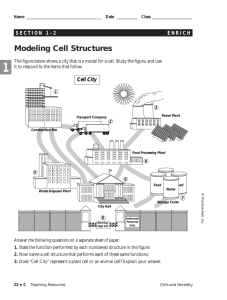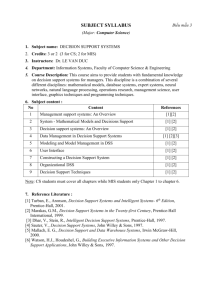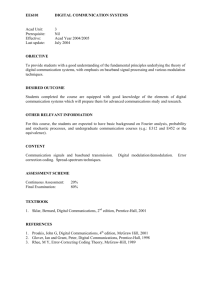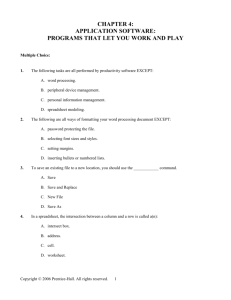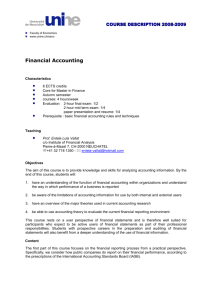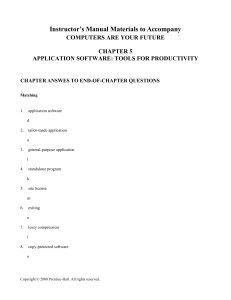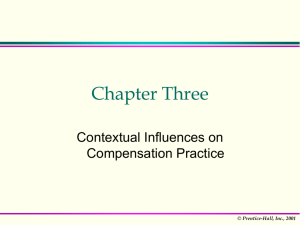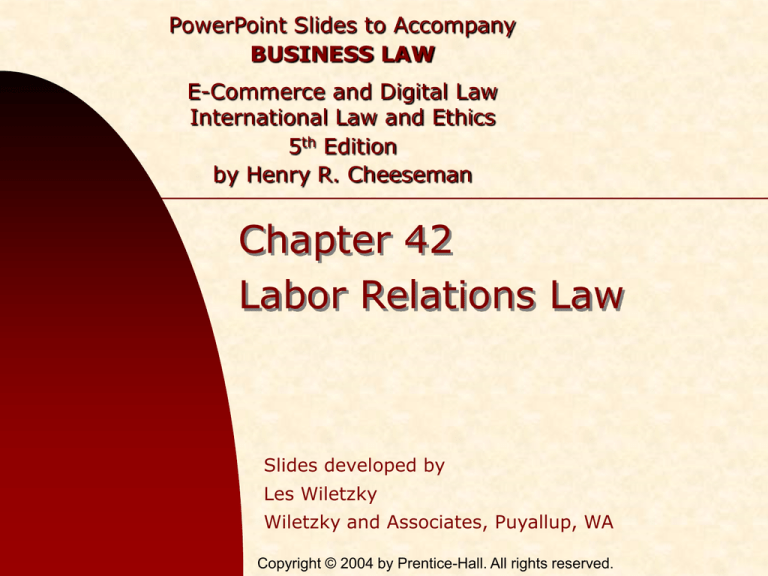
PowerPoint Slides to Accompany
BUSINESS LAW
E-Commerce and Digital Law
International Law and Ethics
5th Edition
by Henry R. Cheeseman
Chapter 42
Labor Relations Law
Slides developed by
Les Wiletzky
Wiletzky and Associates, Puyallup, WA
Copyright © 2004 by Prentice-Hall. All rights reserved.
The right of workers to form,
join, and assist labor unions is
a statutorily protected right in
the United States.
Copyright © 2004 by Prentice-Hall. All rights reserved.
42 - 2
Federal Labor Union Statutes
Norris-LaGuardia
Act
National Labor
Relations Act
Labor-Management
Relations Act
Railway Labor
Act
Labor-Management
Reporting and
Disclosure Act
Copyright © 2004 by Prentice-Hall. All rights reserved.
42 - 3
Norris-LaGuardia Act of 1932
Stipulates that it is legal for employees to
organize.
Removes the federal courts’ power to enjoin
peaceful union activity.
Copyright © 2004 by Prentice-Hall. All rights reserved.
42 - 4
National Labor Relations Act of 1935
Also known as the Wagner Act or NLRA.
Establishes the right of employees to:
form, join, and assist labor organizations
bargain collectively with employers
engage in concerted activity to promote these
rights
Places an affirmative duty on employers to
bargain and deal in good faith with unions.
Copyright © 2004 by Prentice-Hall. All rights reserved.
42 - 5
Labor-Management Relations Act of 1947
Amended the Wagner Act.
Also known as the Taft-Hartley Act.
Expands the activities that labor unions can
engage in.
Gives employers the right to engage in freespeech efforts against unions prior to a union
election.
Gives the President the right to seek an
injunction against a strike that would create a
national emergency.
Copyright © 2004 by Prentice-Hall. All rights reserved.
42 - 6
Labor-Management Reporting and
Disclosure Act of 1959
Also known as the Landrum-Griffin Act.
Regulates internal union affairs and
establishes the rights of union members.
Requires regularly scheduled elections for
union officials by secret ballot
Prohibits ex-convicts and communists from
holding union office
Makes union officials accountable for union
funds and property
Copyright © 2004 by Prentice-Hall. All rights reserved.
42 - 7
Railway Labor Act of 1926 (amended in
1934)
Covers employees of railroad and airline
carriers.
This act permits:
self-organization of employees
prohibits interference with this right
provides for the adjustment of grievances
Copyright © 2004 by Prentice-Hall. All rights reserved.
42 - 8
National Labor Relations Board (NLRB)
Administrative agency created by the
National Labor Relations (Wagner) Act.
Oversees union elections
Prevents employers and unions from
engaging in illegal and unfair labor practices
Enforces and interprets certain federal labor
laws.
NLRB decisions are enforceable in court.
Copyright © 2004 by Prentice-Hall. All rights reserved.
42 - 9
Organizing a Union
Section 7 of the NLRA – gives employees
the right to join together to form a union.
Appropriate Bargaining Unit – the group
that the union is seeking to represent.
Must be defined before the union can petition
for an election.
Managers and professional employees may
not belong to unions formed by employees
whom they manage.
Copyright © 2004 by Prentice-Hall. All rights reserved.
42 - 10
Types of Union Elections
30 percent of the employees in the
bargaining unit must indicate interest in
joining or forming a union.
NLRB is petitioned, investigates and sets
election date.
Contested election
Consent election
Decertification election
Copyright © 2004 by Prentice-Hall. All rights reserved.
42 - 11
Union Elections (continued)
If a simple majority of the employees of the
appropriate bargaining unit vote to join a
union,
the union is certified as the bargaining agent
of all the employees,
even those who did not vote for the union.
Copyright © 2004 by Prentice-Hall. All rights reserved.
42 - 12
Union Solicitation on Company Property
An employer may restrict union solicitation
activities by employees to nonworking areas
during employees’ free time.
Off-duty employees may be barred from
union solicitation on company premises.
Non-employee union organizers or officers
may be prohibited from soliciting on behalf of
the union anywhere on company property.
Copyright © 2004 by Prentice-Hall. All rights reserved.
42 - 13
Union Solicitation on Company Property
(continued)
Inaccessibility Exception
A rule that permits employees and union
officials to engage in union solicitation on
company property if the employees are
beyond reach of reasonable union efforts to
communicate with them.
Copyright © 2004 by Prentice-Hall. All rights reserved.
42 - 14
Illegal Interference with an Election
Section 8(a) of the NLRA – makes it an
unfair labor practice for an employer to
interfere with, coerce, or restrain employees
from exercising their statutory right to form
and join a union.
Section 8(b) of the NLRA – prohibits unions
from engaging in unfair labor practices that
interfere with a union election.
Copyright © 2004 by Prentice-Hall. All rights reserved.
42 - 15
Worker Adjustment and Retraining Notification
(WARN) Act of 1988
Covers employers with 100 or more
employees.
Requires employers to give their employees
60 days’ notice before engaging in certain
plant closings or layoffs.
If the employees are represented by a union,
the notice must be given to the union.
If they are not, the notice must be given to the
employees individually.
Copyright © 2004 by Prentice-Hall. All rights reserved.
42 - 16
Collective Bargaining
The act of negotiating contract terms between
an employer and the members of a union.
Collective Bargaining Agreement – the
resulting contract from a collective bargaining
procedure.
The employer and the union must bargain with
each other in good faith.
Copyright © 2004 by Prentice-Hall. All rights reserved.
42 - 17
Subjects of Collective Bargaining
Compulsory Subjects
Wages
Hours
Other terms and conditions of employment
Illegal Subjects
Closed shops
Discrimination
Copyright © 2004 by Prentice-Hall. All rights reserved.
42 - 18
Subjects of Collective Bargaining
(continued)
Permissive Subjects
Size and composition of the supervisory force
Location of plants
Corporate reorganizations
Any other subjects that are not compulsory or
illegal
Copyright © 2004 by Prentice-Hall. All rights reserved.
42 - 19
Union Security Agreements
Union Shop
Employee must join the union within a certain
number of days after being hired.
Employees who do not join must be
discharged by the employer upon notice from
the union.
Union members pay union dues to the union.
Union shops are lawful.
Copyright © 2004 by Prentice-Hall. All rights reserved.
42 - 20
Union Security Agreements (continued)
Agency Shop
Employees do not have to become union
members.
They do have to pay an agency fee (an
amount equal to union dues) to the union.
Agency shops are lawful.
Copyright © 2004 by Prentice-Hall. All rights reserved.
42 - 21
Check-Off Provision
Upon proper notification by the union, union
shop and agency shop employers are
required to:
1. Deduct union dues and agency fees from
employees’ wages, and
2. Forward these dues to the union.
This is called a check-off provision.
Copyright © 2004 by Prentice-Hall. All rights reserved.
42 - 22
State Right-to-Work Laws
Section 14(b) of the Taft Hartley Act –
allows states to enact right-to-work laws that
outlaw union or agency shops.
Individual employees cannot be forced to join
a union or pay union dues and fees even
though a union has been elected by other
employees.
21 states have enacted right-to-work laws.
Copyright © 2004 by Prentice-Hall. All rights reserved.
42 - 23
Strikes
The NLRA gives union management the right
to recommend that the union call a strike if a
collective bargaining agreement cannot be
reached.
A majority vote of the union’s members must
agree to the action before there can be a
strike.
Copyright © 2004 by Prentice-Hall. All rights reserved.
42 - 24
Employer Lockout
Act of the employer to prevent
employees from entering the work
premises when the employer
reasonably anticipates a strike.
Copyright © 2004 by Prentice-Hall. All rights reserved.
42 - 25
Crossover Worker
Individual members of a union do not have
to honor the strike.
They may:
1. Choose not to strike, or
2. Return to work after joining the strikers for a
time
Copyright © 2004 by Prentice-Hall. All rights reserved.
42 - 26
Replacement Workers
Workers who are hired to take the place of
striking workers.
They can be hired on either a temporary or
permanent basis.
If replacement workers are given permanent
status, they do not have to be dismissed
when the strike is over.
Copyright © 2004 by Prentice-Hall. All rights reserved.
42 - 27
Illegal Strikes
Several types of strikes have been held to be
illegal.
They are not protected by federal labor law.
Illegal strikers may be discharged by the
employer with no rights to reinstatement.
Copyright © 2004 by Prentice-Hall. All rights reserved.
42 - 28
Illegal strikes are:
Violent Strikes
Wildcat Strikes
Sit-Down Strikes
Strikes during the 60day Cooling-Off Period
Partial or Intermittent
Strikes
Strikes in Violation of a
No-Strike Clause
Copyright © 2004 by Prentice-Hall. All rights reserved.
42 - 29
Picketing
The actions of strikers walking in front of the
employer’s premises carrying signs
announcing their strike.
The right to picket is implied from the NLRA.
An employer may seek an injunction against
unlawful picketing.
Copyright © 2004 by Prentice-Hall. All rights reserved.
42 - 30
Picketing (continued)
Picketing is lawful unless it
1. It is accompanied by violence
2. Obstructs customers from entering the employer’s
place of business
3. Prevents non-striking employees from entering the
employer’s premises
4. Prevents pickups and deliveries at the employer’s
place of business
Copyright © 2004 by Prentice-Hall. All rights reserved.
42 - 31
Secondary Boycott Picketing
A type of picketing where unions try to bring
pressure against an employer by picketing
his or her suppliers or customers.
Such picketing is lawful only if it is product
picketing.
It is illegal if it is directed against the neutral
employer instead of the struck employer’s
product.
Copyright © 2004 by Prentice-Hall. All rights reserved.
42 - 32
Internal Union Affairs
Unions may adopt internal union rules to
regulate the operation of the union, acquire
and maintain union membership, etc.
Title I of the Landrum-Griffin Act – referred
to as labor’s bill of rights. Gives each union
member equal rights and privileges to:
Nominate candidates for union office
Vote in elections
Participate in membership meetings
Copyright © 2004 by Prentice-Hall. All rights reserved.
42 - 33
Internal Union Affairs (continued)
A union may discipline members for:
Walking off the job in a non-sanctioned strike
Working for wages below union scale
Spying for an employer
Any other unauthorized activity that has an
adverse economic impact on the union
Copyright © 2004 by Prentice-Hall. All rights reserved.
42 - 34

